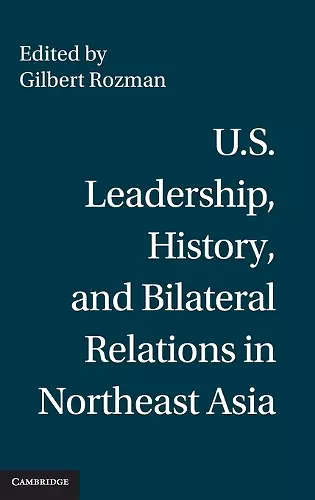U.S. Leadership, History, and Bilateral Relations in Northeast Asia
Format:Hardback
Publisher:Cambridge University Press
Published:21st Oct '10
Currently unavailable, and unfortunately no date known when it will be back

This book explores the rising importance of history in reshaping international relations in Northeast Asia.
Whereas most discussions of history have centered on the rift between China and Japan, this book focuses on three other divisions stemming from deep-seated memories within Northern Asia, which increasingly will test U.S. diplomacy and academic analysis. The first division involves long-suppressed Japanese and South Korean memories that are critical of U.S. behavior – concerning issues such as the atomic bombings, the Tokyo Tribunal, and the Korean War. The second division is the enduring disagreement between Japan and South Korea over history. What can the United States do to invigorate urgently needed trilateral ties? The third and most important division is the revival of a sinocentric worldview, which foretells a struggle between China and other countries concerning history, one that has already begun in China's dispute with South Korea and is likely to implicate the United States above all.
“The role of history and memory in bilateral relations has lately become a big subject in the field. This volume goes much further by exploring the role of the United States in managing historical controversies between its allies (Japan and South Korea), as well as between an ally (South Korea) and a competitor (China). It is a must-read for anyone interested in ‘soft clashes’ in the region of East Asia.” —Jae Ho Chung, Seoul National University
“This is an important book. The emergence of China as a great power and North Korea’s nuclear threat call for the need to create a stable multilateral international system in Northeast Asia. The triangular alliance among the United States, Japan, and South Korea bound by the common values of liberal democracy and capitalism should play a crucial role in this goal. But highly contested battles over historical memories have separated them, preventing them from forging a stable alliance. Focusing on three contentious battles—Japanese and south Korean memories against the United States, disagreements between Japan and South Korea, and the historical contention between China and South Korea over the ancient kingdom, Koguryo—the authors forcefully argue that the United States, which has avoided getting involved in the debate, is well-advised to confront the issues squarely, if a stable international system was to be established in the region.” —Tsuyoshi Hasegawa, University of California, Santa Barbara
“An excellent contribution to the growing literature on how historical memory shapes the international politics of Northeast Asia. In an era of shifting regional power balances, this volume makes a compelling case for greater U.S. leadership in the process of historical reconciliation.” —Mike Mochizuki, George Washington University
ISBN: 9780521190565
Dimensions: 235mm x 160mm x 20mm
Weight: 540g
246 pages